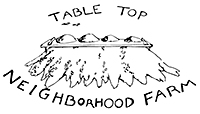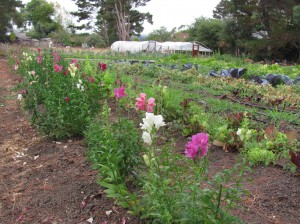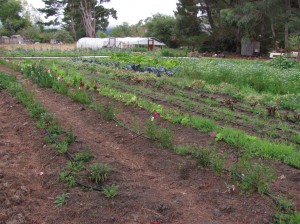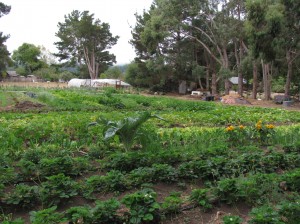We hope this update from the farm finds you all well and excited for the burgeoning summer to come. Vanessa and I have been enjoying the daily harvests that have been keeping the farm stand stocked: snow peas, sugar snap peas, spring onions, swiss chard, kale, and baby lettuce mix. Lately we’ve had a steady flow of neighbors and others from around the community stopping by the farm stand. Its been wonderful to talk to new folks and get to know people in our community better. And it has been going at a good pace for us, because so far, by the evening, most of the harvest is amazingly gone! We are trying to balance the harvest with the amount that seems to be getting used in order to reduce wasted veggies. Also, we’ll need more people to know about the farm stand. Getting the word out just by telling friends and neighbors is probably the best that way we can imagine increasing knowledge in our community of this great resource for fresh veggies and local farming. We’d like to let the word spread organically, at this point, without too much actual advertising.
This last month we’ve been planting planting planting. As we were able to get the soil worked and the beds made, lots of seeds and transplants were planted in the ground. Since May, we’ve started and transplanted beans, more sugar snap peas, celery, carrots, more beets, basil, cilantro, sage, oregano, thyme, more lettuce, tomatoes, cucumbers, zucchini, more kale, flowers, and strawberries. Our early season tomatoes are already turning color! Today, Vanessa is busy planting the winter squash and fingerling potatoes. So there is much more to come. We hope to have daily harvests through December and beyond, if possible. With appropriate break times, for the farmers, of course!
The weather has been great – mostly sunny with cool interludes of fog and mist. The purple sprouting broccoli and cauliflower, although planted late, seem to be gearing up for giving forth a purple yield. We’ve been eagerly awaiting action on the part of the forces of nature that allow these plants to mature. But we are always reminded that there is a patience that the plants have that is deeper than even our own abilities to wait – and we’re trusting that once they’re ready, the plants will know they are ready, and they’ll be that much more delicious! The beautiful purple cabbage will follow the harvest of these crops.
The amazing abundance of snow peas and sugar snap peas has heartened us and strengthened our enthusiasm for the many harvests to come throughout the seasons. Its been amazing to literally watch the snow peas grow throughout the day. Last Sunday, we witnessed the growth of 2 pounds of snow peas in a matter of 6 hours and were able to pick them three times that day. As the quantities dwindled in the farm stand boxes, there was another little batch growing out in the field. It is quite an incredible experience to simply bring them from the plants growing in the field to the farm stand and within minutes watch them be consumed by appreciative, eager neighbors and passers-by. I just keep thinking about how experiencing the pleasure of something as simple as fresh food, gives us a stronger connection to the place we live in. When we eat the food fresh from the harvest like that, we are literally eating the air, the water, the soil, the life in the soil and the energy that went into creating the food. We know we are part of it. And luckily we have taste buds to taste and appreciate it! Because its really delicious!
Sometimes people ask me if we’re certified organic. For those of you who have wondered, I thought I’d post the following recently posted description in here, for a better idea of our ever-expanding philosophy of growing the veggies:
“We grow organically and more. We are really excited about improving soil health and vigor, and on being as low-tech as possible to reduce our fossil fuel footprint. We make our own compost using organic ingredients (hay and kitchen scraps and horse manure), deeply prepare all the rows, use minimal tillage, intensive plant spacing and soil conservation techniques, and improve the microbiology and life of the soil by adding special compost teas to the soil around our plants as they grow. We are very resource conservation-oriented and save huge amounts of water by starting most of our plants in the greenhouse and then transplanting them, and by using T-tape irrigation, which reduces water use. Once most plants are about 1/2 way through their cycle, we limit irrigation to improve the taste, promote root growth, and decrease the water usage.”
It is these techniques and more that will make it possible to grow larger amounts of crops in our area on somewhat marginal soils with limited water supplies. Although organic certification programs are an incredible tool we have to protect consumers and create healthy farms, certification does not touch the land stewardship issues, ecological sustainability, or resource conservation issues. It would be amazing to start a community-based, local certification program that is based in land stewardship, as well as incorporating the organic standards. That’s one thing we would love to have in our community in the near future. We encourage our neighbors and others in the community to come walk the farm with us and see the plants growing. This is the best way to get an understanding of the relationship between the ourselves and the land.



